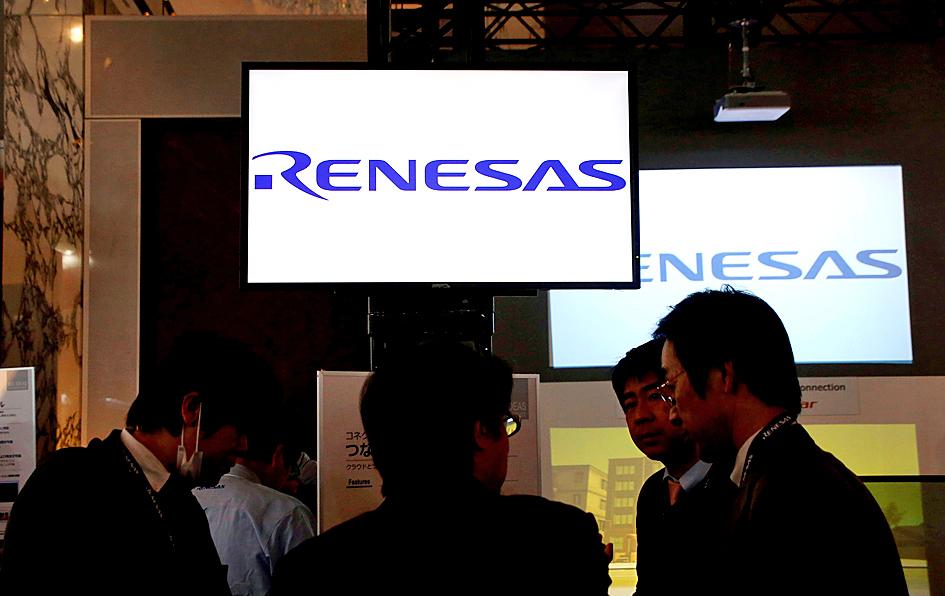Renesas Electronics Corp of Japan has agreed to acquire Dialog Semiconductor PLC, the UK chip designer whose clients include Apple Inc, marking another UK-based semiconductor company being sold to Asian investors.
Renesas is making an all-cash offer of 67.50 euros per share, it said in a statement yesterday.
The Japanese company would pay about 4.9 billion euros (US$5.9 billion) to take over its target, Bloomberg News reported on Sunday.

Photo: Reuters
Dialog has agreed to the terms of the transaction, it said in a statement yesterday.
The offer price is a 20 percent premium to Dialog’s Friday close of 56.12 euros.
Shares of the Frankfurt-listed company have risen about 25 percent since the start of the year, boosted by strong demand for Apple’s 5G handsets, as well as takeover speculation.
Renesas shares dropped 3.60 percent to ¥1,203 in Tokyo.
Dialog had been in advanced discussions with suitors, including Renesas, and working with advisers, people familiar with the matter said on Sunday.
The company was previously holding discussions with STMicroelectronics NV before the Franco-Italian company was outbid, the people said at the time.
In September, Nvidia Corp agreed to buy Softbank Group Corp’s chip division Arm Ltd for US$40 billion, taking control of some of the most widely used chip technology in the industry’s largest-ever deal, while chip designer Imagination Technologies Group PLC was sold to Chinese-backed investor Canyon Bridge Capital Partners in late 2017.
Any deal could draw scrutiny from UK regulators as countries grow more protective of strategic industries such as semiconductors.
The UK government is also planning to introduce new rules that would allow officials to look at past takeovers and mergers where concerns have been raised.
Renesas, which had a market value of US$20.5 billion as of Friday’s close, is one of the largest suppliers of semiconductors used in vehicles. It also has European offices in the UK and Germany.
In 2019, Renesas completed its acquisition of US firm Integrated Device Technology Inc, a deal valued at more than US$6 billion that helped it expand beyond the automotive sector.
Dialog and Renesas have been working together for more than a decade.
The UK company, which specializes in designing power management chips, said in August that it would collaborate with Renesas on car computing platforms.
Both companies have found themselves part of tensions concerning the semiconductor supply chain.
Apple was grappling with a shortage of vital chips that manage power consumption in iPhones and other devices, people with knowledge of the matter said in November.
Within the auto industry, a semiconductor shortage is forcing automakers to halt production lines and is straining their relationship with chip suppliers.

Vincent Wei led fellow Singaporean farmers around an empty Malaysian plot, laying out plans for a greenhouse and rows of leafy vegetables. What he pitched was not just space for crops, but a lifeline for growers struggling to make ends meet in a city-state with high prices and little vacant land. The future agriculture hub is part of a joint special economic zone launched last year by the two neighbors, expected to cost US$123 million and produce 10,000 tonnes of fresh produce annually. It is attracting Singaporean farmers with promises of cheaper land, labor and energy just over the border.

US actor Matthew McConaughey has filed recordings of his image and voice with US patent authorities to protect them from unauthorized usage by artificial intelligence (AI) platforms, a representative said earlier this week. Several video clips and audio recordings were registered by the commercial arm of the Just Keep Livin’ Foundation, a non-profit created by the Oscar-winning actor and his wife, Camila, according to the US Patent and Trademark Office database. Many artists are increasingly concerned about the uncontrolled use of their image via generative AI since the rollout of ChatGPT and other AI-powered tools. Several US states have adopted

A proposed billionaires’ tax in California has ignited a political uproar in Silicon Valley, with tech titans threatening to leave the state while California Governor Gavin Newsom of the Democratic Party maneuvers to defeat a levy that he fears would lead to an exodus of wealth. A technology mecca, California has more billionaires than any other US state — a few hundred, by some estimates. About half its personal income tax revenue, a financial backbone in the nearly US$350 billion budget, comes from the top 1 percent of earners. A large healthcare union is attempting to place a proposal before

KEEPING UP: The acquisition of a cleanroom in Taiwan would enable Micron to increase production in a market where demand continues to outpace supply, a Micron official said Micron Technology Inc has signed a letter of intent to buy a fabrication site in Taiwan from Powerchip Semiconductor Manufacturing Corp (力積電) for US$1.8 billion to expand its production of memory chips. Micron would take control of the P5 site in Miaoli County’s Tongluo Township (銅鑼) and plans to ramp up DRAM production in phases after the transaction closes in the second quarter, the company said in a statement on Saturday. The acquisition includes an existing 12 inch fab cleanroom of 27,871m2 and would further position Micron to address growing global demand for memory solutions, the company said. Micron expects the transaction to